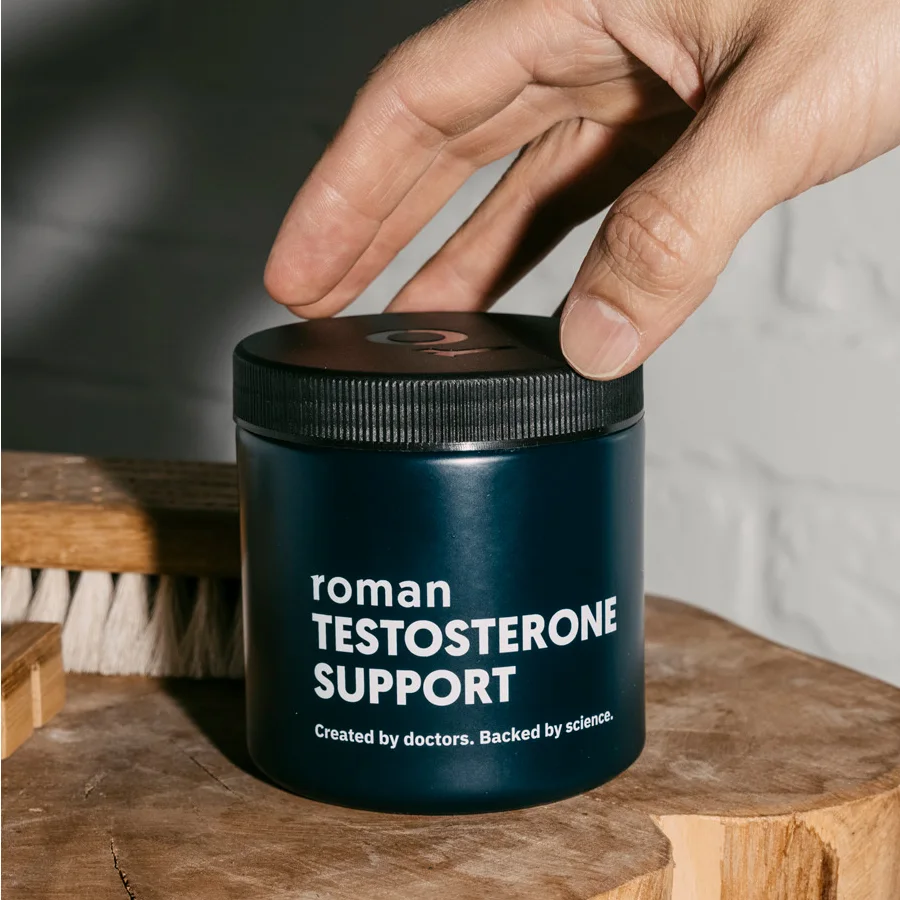Here's what we'll cover
Here's what we'll cover
There are many reasons a person might require testosterone injections. Lots of people might know that testosterone is used to treat conditions that cause low testosterone (also known as low T or hypogonadism). But testosterone (in many forms) is also used to treat gender dysphoria in nonbinary people, transgender men, and others before or after gender-affirming surgeries.
Testosterone cypionate is an FDA-approved injection used to treat low T. It’s also commonly prescribed to treat gender dysphoria. This form of testosterone is known as a depot, which means a testosterone cypionate injection only requires an injection every 2 to 4 weeks. Continue reading to learn more about testosterone cypionate injections.
What is testosterone cypionate?
Testosterone cypionate is an injectable form of testosterone (T) that’s available by prescription only. It's also known under the brand name Depo-testosterone. If taken correctly, it can raise T levels to what is considered “normal” for biological adult men.
Because it is a depot injection (slow release), testosterone cypionate has a long half-life. To provide a chemistry refresher, half-life is a measurement of how long it takes your body to process, absorb, and get rid of a drug. The longer the half-life, the more time a medication has to work—which is why this form of T only requires an injection every 2 to 4 weeks.
Testosterone cypionate is FDA-approved to treat hypogonadism in patients who can’t produce enough testosterone on their own (Mulhall, 2018). As mentioned, It’s also useful in treating gender dysphoria in people seeking masculinization. T injections are used in the gender-affirming process and can even reduce anxiety, social distress, and depression (Hembree, 2017).
Testosterone is commonly regarded as a “male” sex hormone responsible for functions like sexual health and performance. But actually, testosterone contributes to many functions in all people.
When testosterone levels become low or high, certain bodily functions that rely on testosterone may suffer. There are several conditions that testosterone levels play a role in, including (Saad, 2017):
Mood and depressive disorders
Red blood cell conditions (like anemia and changes in hemoglobin levels)
Bone mineral density loss and loss in bone strength
Using testosterone to raise T levels has become increasingly common in the United States over the last decade. A study reported that in 2013, an estimated 2.3 million American men were receiving testosterone replacement therapy (Petering, 2017).
What conditions does testosterone cypionate treat?
Testosterone cypionate can provide benefits to people with a wide variety of conditions, circumstances, and gender identities. Most notably, testosterone cypionate treats hypogonadism (low T) and gender dysphoria.
Hypogonadism
There are several potential causes of low T. Some forms of hypogonadism are genetic, and others are acquired.
Here are some ways that biological men can develop low T (Petering, 2017):
Aging (the most common cause)
Human immunodeficiency virus infection (HIV)
Taking certain medications for extended periods (like steroids)
Chronic kidney disease
People with hypogonadism can have many symptoms. The most common symptoms are breast discomfort, loss of bone density, loss of body hair, and decreased libido (sex drive). If you’re experiencing symptoms of low T, pay a visit to your healthcare provider who can run a blood test to measure your serum testosterone levels.
So, does taking testosterone relieve these symptoms?
The Testosterone Trials (aka T-trials) were coordinated large-scale clinical trials that followed 788 older men with hypogonadism for one year. Half of the participants were given testosterone replacement therapy, and the other half were given a placebo. Here are the reported risks and benefits (Snyder, 2018):
Benefits: improved sexual function, slightly improved mood, improved bone mineral density, and bone strength, improved mild to moderate anemia
Risks: increased coronary artery plaque volume, changes in cholesterol, the potential for cardiovascular problems
When it comes to finding balance between the risks and benefits of TRT, only you and your healthcare provider can decide what’s best for you. Speak to your provider about your concerns, and they will help you develop a safe and effective treatment plan.
Gender dysphoria
Testosterone therapy in transgender men may alleviate psychological distress resulting from gender dysphoria (Gómez-Gil, 2012). Testosterone can be useful before and after any gender-affirming surgery.
Hormone therapy in trans men and nonbinary people is usually in pursuit of masculinization. Masculinization can include a deeper voice, increased hair growth, and increased lean muscle mass. These changes (commonly called virilization in scientific studies) typically appear after several months of testosterone therapy (Unger, 2016).
As T becomes more commonly prescribed to trans men and nonbinary people, more clinical trials are necessary to evaluate its effect on this community.
Side effects of testosterone injections
Testosterone cypionate is a medication you have to inject yourself at home. It’s given as an intramuscular (into the muscle) injection. Talk to your healthcare provider about how to properly inject testosterone. You’ll need syringes, alcohol wipes, and a sharps container for proper disposal.
You should store testosterone cypionate at room temperature to prevent crystals from forming. If they do form, you can get rid of them by rolling the bottle in between your palms before drawing the dose up in the syringe.
It’s possible to have an allergic reaction to the contents in testosterone cypionate injection. If you experience any severe symptoms of an allergy (severe swelling at the injection site, hives, trouble breathing) after your first dose, do not take a second dose and seek immediate medical care.
Although research is varied, the FDA warns that using testosterone may increase risk of heart problems. The risk of toxicity is higher in those with pre-existing heart disease, especially older patients (FDA, 2018).
Testosterone should not be prescribed to people with breast cancer, people who are pregnant or who are trying to become pregnant, those with certain blood conditions, and people living with prostate cancer. Testosterone can impact these conditions and sometimes make them worse. Using testosterone for extended periods of time can also increase risk of liver problems.
Testosterone is a schedule III controlled substance and has the potential for abuse. Taking high doses of testosterone or using it in combination with anabolic steroids can lead to severe and life-threatening side effects, like heart attacks and strokes (Elagizi, 2018).
Some of the more common side effects of injectable testosterone include (MedlinePlus, 2019):
Pain or redness at the injection site
Acne or skin changes
More frequent erections that last longer than normal
Gynecomastia (enlargement of breast tissue)
Headaches
Sleep apnea
Edema (fluid retention)
Polycythemia (an increase in red blood cells)
Changes in metabolites (raises calcium levels, lowers potassium)
Testosterone can interact with other prescription drugs. Blood thinners like warfarin taken in combination with T can put you at a much higher risk for bleeding, for example.
If you have been diagnosed with low T or experience gender dysphoria, talk with your healthcare provider about testosterone cypionate. Whatever your needs are, your provider can help you develop a safe and effective treatment plan that’s right for you.
DISCLAIMER
If you have any medical questions or concerns, please talk to your healthcare provider. The articles on Health Guide are underpinned by peer-reviewed research and information drawn from medical societies and governmental agencies. However, they are not a substitute for professional medical advice, diagnosis, or treatment.
Elagizi, A., Köhler, T. S., & Lavie, C. J. (2018). Testosterone and cardiovascular health. Mayo Clinic Proceedings , 93 (1), 83–100. doi: 10.1016/j.mayocp.2017.11.006. Retrieved from https://pubmed.ncbi.nlm.nih.gov/29275030
Gómez-Gil, E., Zubiaurre-Elorza, L., Esteva, I., et al. (2012). Hormone-treated transsexuals report less social distress, anxiety and depression. Psychoneuroendocrinology , 37 (5), 662–670. doi: 10.1016/j.psyneuen.2011.08.010. Retrieved from https://pubmed.ncbi.nlm.nih.gov/21937168/
Hembree, W. C., Cohen-Kettenis, P. T., Gooren, L., et al. (2017). Endocrine treatment of gender-dysphoric/gender-incongruent persons: an Endocrine Society clinical practice guideline. The Journal of Clinical Endocrinology and Metabolism , 102 (11), 3869–3903. doi: 10.1210/jc.2017-01658. Retrieved from https://pubmed.ncbi.nlm.nih.gov/28945902/
MedlinePlus. (2019). Testosterone injection. Retrieved from https://medlineplus.gov/druginfo/meds/a614041.html
Mulhall, J. P., Trost, L. W., Brannigan, R. E., et al. (2018). Evaluation and management of testosterone deficiency: AUA guideline. The Journal of Urology , 200 (2), 423–432. doi:10.1016/j.juro.2018.03.115. Retrieved from https://pubmed.ncbi.nlm.nih.gov/29601923/
Petering, R. C. & Brooks, N. A. (2017). testosterone therapy: review of clinical applications. American Family Physician , 96 (7), 441–449. Retrieved from https://pubmed.ncbi.nlm.nih.gov/29094914/
Saad, F., Röhrig, G., von Haehling, S., & Traish, A. (2017). Testosterone deficiency and testosterone treatment in older men. Gerontology , 63 (2), 144–156. doi: 10.1159/000452499. Retrieved from https://pubmed.ncbi.nlm.nih.gov/27855417/
Snyder, P. J., Bhasin, S., Cunningham, G. R., et al. (2018). Lessons from the testosterone trials. Endocrine Reviews , 39 (3), 369–386. doi: 10.1210/er.2017-00234. Retrieved from https://pubmed.ncbi.nlm.nih.gov/29522088/
Unger, C. A. (2016). Hormone therapy for transgender patients. Translational Andrology and Urology , 5 (6), 877–884. doi: 10.21037/tau.2016.09.04. Retrieved from https://pubmed.ncbi.nlm.nih.gov/28078219/
U. S. Food and Drug Administration (FDA). (2018). FDA Drug Safety Communication: FDA cautions about using testosterone products for low testosterone due to aging; requires labeling change to inform of possible increased risk of heart attack and stroke with use . Retrieved from https://www.fda.gov/drugs/drug-safety-and-availability/fda-drug-safety-communication-fda-cautions-about-using-testosterone-products-low-testosterone-due /
Zitzmann, M., Mattern, A., Hanisch, J., et al. (2013). IPASS: a study on the tolerability and effectiveness of injectable testosterone undecanoate for the treatment of male hypogonadism in a worldwide sample of 1,438 men. The Journal of Sexual Medicine , 10 (2), 579–588. doi: 10.1111/j.1743-6109.2012.02853.x. Retrieved from https://pubmed.ncbi.nlm.nih.gov/22812645/










